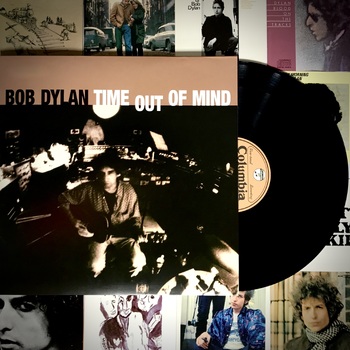DYLAN TIME
Author: Bruce Jenkins Date Posted:16 September 2022

The 1990s were a patchy time for fans of folk legend Bob Dylan. A couple of "OK" albums early in the decade were followed by a celebratory concert, an MTV Unplugged recording, and an album of lesser known folk songs. Dylan toured extensively, but did not write many songs.
So when the Daniel Lanois produced Time Out Of Mind arrived in 1997 and it was clearly a strong work, sighs of relief could be felt around the world. Having been the voice of youthful challenge in the early 1960s, Dylan, deep into his sixth decade, had nothing to prove, musically speaking at least. In fact the twisting road of fame and fortune might easily have made the poet-songwriter complacent. Comfortable, even. Ready to sit on a well-padded couch and relax a little. But Dylan was not having a bar of that.
Time Out Of Mind is dark, gritty, and often bleak. It is the middle-aged pilgrim slogging through a friendless twilight in the uncertain hope of finding warmth and safety in the approaching dark. "Dirt Road Blues", "Million Miles", the song titles tell the story. Lanois’ production adds a shimmering tension to songs that appear to be about love and loss, but are redolent with mortality. Echo-laden guitars and plaintive organ add textures of an old forest; lichen clings, leaves fall, shadows flicker. It is a beguiling sound you can get lost in.
Tramping through the undergrowth, making his own path with heavy feet, comes Dylan. His voice is aged oak, there is mud on his shoes; he walks slowly but with determination. Not so much raging against the dying of the light—to quote Dylan Thomas, the poet whose name Bob appropriated—as gritting his teeth and wrapping a threadbare cloak around himself.
Feel like my soul has
Turned into steel
I’ve still got the scars
That the sun didn’t heal
There’s not even room enough
To be anywhere
It’s not dark yet
But it’s getting there
There are longer songs on the album, but "Not Dark Yet" is its centrepiece. It is a story of adventure and survival that has left the teller depleted and spiritually exhausted, his own demise filling the horizon. Or perhaps not. Dylan’s lyrics have always had multiple layers and this set of songs is no exception. Scars the Son didn’t heal? Religious imagery abounds, particularly attached to questions regarding one’s destination after dying: up or down? Dylan doesn’t seem to entertain the idea that death is just the end. Endings, however are another recurrent theme on Time Out Of Mind. Mostly these are couched in terms of relationships that have failed. Bob has not, it is clear, been fortunate in love. Perhaps that is because he is the eternal traveller, a homeless pilgrim in search of a manger.
"Highlands", referencing the poem of Scot Robert Burns, is the epic closing track, replete with twenty wandering verses and an odd, almost light-hearted encounter between the poet and a waitress. Almost. There is tension, as there is throughout this intriguing, captivating album.
Given the lyrical themes and frequent allusions to blues and folk songs, the lyrical pickings for dedicated Dylanologists are rich indeed. But Time Out Of Mind, for all its sombre tone, is far from a depressing listen. To a great extent that is down to the Lanois production, but there is also the experience of going on a long (seventy-five minute) journey with a master storyteller. At the end you are tired, but satisfied.
PS. If you find a copy with the bonus single of "Love Sick", grab it. The B-side has a storming live version of "Cold Irons Bound".
© Bruce Jenkins—September 2002









